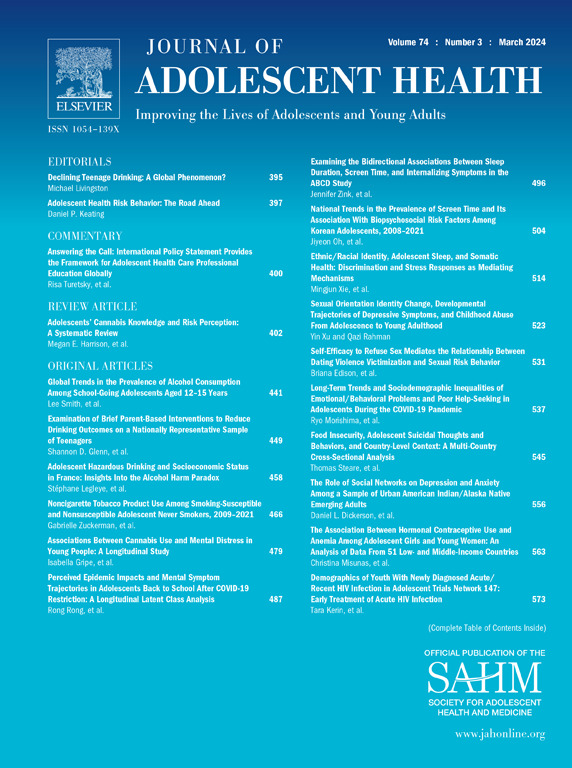Providing Survivorship Care for a Young Adult With a History of Blood Cancer
IF 5.5
2区 医学
Q1 PEDIATRICS
引用次数: 0
Abstract
Adolescents and young adults (AYAs) with a history of cancer are at an increased risk for late effects from their cancer treatment and have higher rates of long-term morbidity and mortality compared to their age-matched peers. As a result, this vulnerable population needs attentive follow-up care, end-organ surveillance, and secondary cancer screening; however, a history of cancer can often become buried on a problem list or not addressed at all. This case report illustrates an AYA survivor of classic Hodgkin lymphoma who relocates to a new city and establishes care with a new primary care provider (PCP). The PCP's awareness of a prior cancer diagnosis and the previous treatment regimen is a critical component in providing comprehensive care. In this case, the PCP's first step is to reach out and collaborate with oncology providers to gather an accurate treatment summary and then consult evidence-based guidelines to develop a plan of care. Based on the patient's previous treatment with chemotherapy adriamycin, bleomycin, vinblastine, and dacarbazine, the PCP orders recommended testing, reviews results, and provides subsequent counseling on health promotion and psychosocial wellness. This case illustrates strategies healthcare providers can use to provide coordinated, evidence-based care for AYA cancer survivors.
为有血癌病史的年轻人提供幸存者关怀。
与年龄相仿的同龄人相比,有癌症病史的青少年和年轻成人(AYAs)因癌症治疗而产生晚期影响的风险更高,长期发病率和死亡率也更高。因此,这一弱势人群需要周到的随访护理、终末器官监测和二次癌症筛查;然而,癌症病史往往会被埋没在问题清单中或根本得不到解决。本病例报告描述了一位典型霍奇金淋巴瘤的青壮年幸存者搬迁到一个新的城市,并与新的初级保健医生(PCP)建立了医疗关系。初级保健医生对既往癌症诊断和既往治疗方案的了解是提供全面护理的关键因素。在这种情况下,初级保健医生的第一步是与肿瘤科医生联系和合作,收集准确的治疗摘要,然后参考循证指南制定护理计划。根据患者之前接受过阿霉素、博来霉素、长春新碱和达卡巴嗪化疗的情况,初级保健医生下达了建议的检查单,审查检查结果,并提供后续的健康促进和社会心理健康咨询。本病例说明了医疗服务提供者为青壮年癌症幸存者提供协调、循证护理的策略。
本文章由计算机程序翻译,如有差异,请以英文原文为准。
求助全文
约1分钟内获得全文
求助全文
来源期刊

Journal of Adolescent Health
医学-公共卫生、环境卫生与职业卫生
CiteScore
10.40
自引率
3.90%
发文量
526
审稿时长
46 days
期刊介绍:
The Journal of Adolescent Health is a scientific publication dedicated to enhancing the health and well-being of adolescents and young adults. Our Journal covers a broad range of research topics, spanning from the basic biological and behavioral sciences to public health and policy. We welcome a variety of contributions, including original research papers, concise reports, literature reviews, clinical case reports, opinion pieces, and letters to the editor. We encourage professionals from diverse disciplines such as Anthropology, Education, Ethics, Global Health, Health Services Research, Law, Medicine, Mental and Behavioral Health, Nursing, Nutrition, Psychology, Public Health and Policy, Social Work, Sociology, and Youth Development to share their expertise and contribute to our mission of promoting adolescent health. Moreover, we value the voices of young individuals, family and community members, and healthcare professionals, and encourage them to submit poetry, personal narratives, images, and other creative works that provide unique insights into the experiences of adolescents and young adults. By combining scientific peer-reviewed research with creative expressions, our Journal aims to create a comprehensive understanding of the challenges and opportunities in adolescent and young adult health.
 求助内容:
求助内容: 应助结果提醒方式:
应助结果提醒方式:


